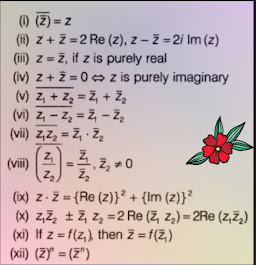what is a Complex Solution in Algebra
In simple words complex number is a largest number. But according to a proper definition:
Every real number is a complex number with 0 as its imaginary part. The number of the form x + ίy, where x, y are real numbers it mean x,y∈ R. and ί=√-1 , are called complex number, here x is called Real part and Y is called imaginary part.
√-1 does not belong to the set of Real numbers. We , therefore, for convenience call it Imaginary number It is also called iota (ί).
Numbers like √-1 and √-5 are pure imaginary numbers. The set of complex Number is denoted by C.
What is a Product of an Imaginary Number and Real Number
The product of a real number and ί is also an imaginary number.
POWERS OF iota(ί)
- (ί)² = -1
- (ί)³= (ί².ί) ⇒ (-1.ί) = -ί
- (ί)⁴ = (ί².ί²) = (-1) (-1) =1
Thus any power of iota (ί) must be equal to 1,ί,-ί,-1.
Operations of Complex Numbers in Algebra
With a view to develop algebra of complex numbers , we state few definitions. The symbols a, b, c, d, k, where use , represent real numbers. Basically operations on complex number are Addition, subtraction, multiplication, division.
- 1) a + ίb = c + ίd ⇒ a = c^b = d
- 2) Addition: (a + ίb) + (c + ίd) = (a + c) + (b + d) ί
- 3) k(a + bί) = ka + kbί
- 4) (a + b) - (c + dί ) = (a + bί) + [-(c + dί)] ⇒ a + bί+ (-c-d ί) ⇒(a - c) + (b - d) ί
- 5) (a + ίb).(c + ίd) = ac + adί + bcί + bdί² ⇒ (ac - bd) + (ad + bc) ί
Define Conjugate Complex Numbers in Algebra
Complex number of the form (a + ίb) and (a -ίb) which have the same real part and whose imaginary parts differ in sign only, are called conjugate of each other.
Conjugate of a real number z = a = a + 0ί coincides with the numbers itself. It means that conjugate of a real number is the same real number.
Example of Conjugate of Numbers in Algebra
5+4i and 5-4i are conjugate of each other.
Polar form of Complex Number in Algebra
polar form of complex number is:
x +ίy = r cos+ r sin
Properties of Fundamental Operations of Complex Numbers in Algebra
It can be easily verified that the set C satisfies all the field axioms. its properties are:
- (i) The additive identity
- (ii) Every complex number (a , b) has the additive inverse (-a , -b) i.e., (a , b) + (-a , -b) = (0 , 0).
- (iii) The multiplicative identity is (1,0) i.e., (a , b).(1 , 0) = (a.1 - b.0 , b.1 + a.0) = (a , b) = (1 , a) (a , b)
- (iv) Every non zero complex Number has a multiplicative inverse.
- The multiplicative inverse of (a , b) is [a/a² + b² , -b/a² + b²] = (1,0) , the identity element.
- (v) (a , b) [(c , d) + (e , f)] = (a , b)(c , d) + (a , b)(e , f)
- (a , b) [(c , d) - (e , f)] = (a , b)(c , d) - (a , b)(e , f)
The set C of a complex Number does not satisfy the order axioms. In fact there is no sense in saying that one complex Number is greater or less than other.









0 Comments